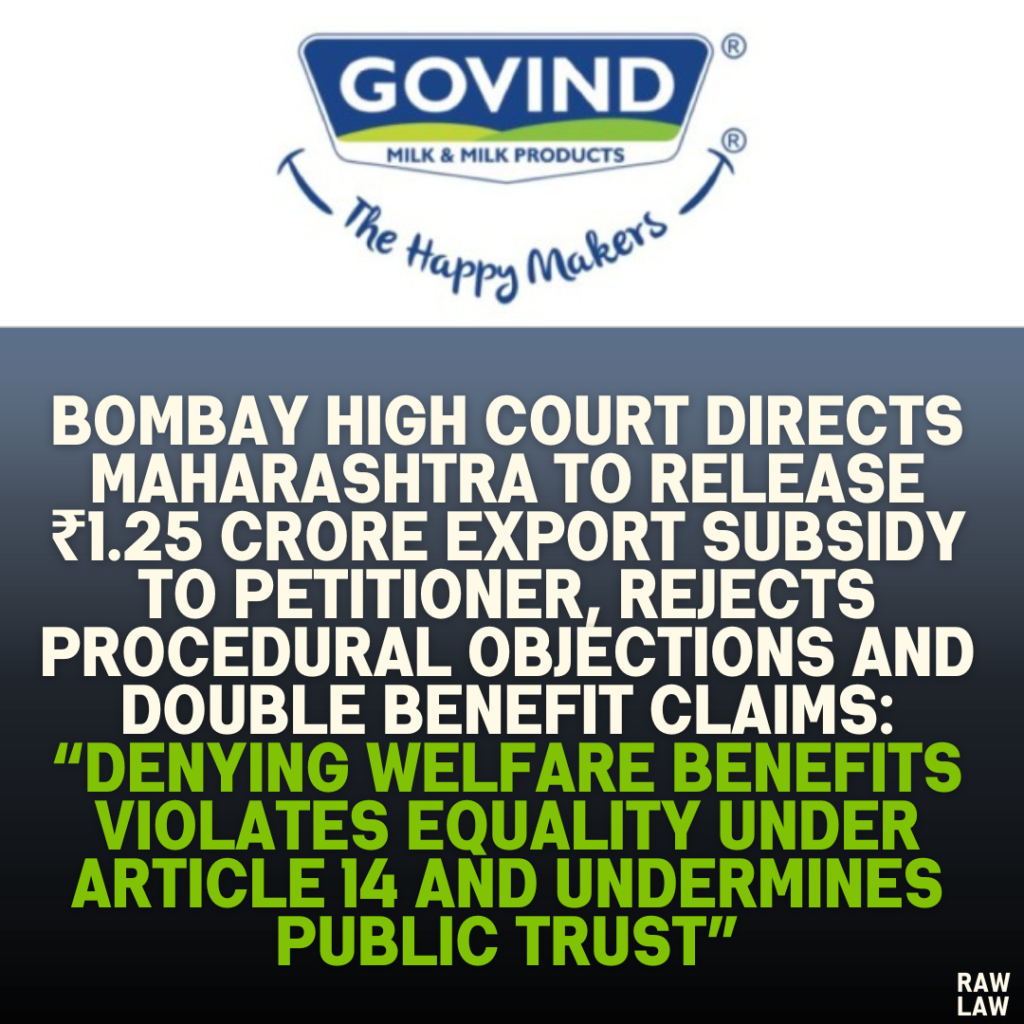Court’s Decision
The Bombay High Court directed the State of Maharashtra to disburse ₹1.25 crore to the petitioner under the Export Subsidy Scheme. The court rejected the state’s arguments against payment, stating that denying the subsidy would violate the principle of equality guaranteed under Article 14 of the Constitution. It also held that procedural objections by the Finance Department could not override judicial directives or the purpose of welfare schemes.
Facts of the Case
- Background of the Scheme:
- In 2018, milk powder prices fell sharply, leading to financial distress among manufacturers and farmers in Maharashtra.
- To mitigate this, the State Government issued a Government Resolution (GR) on July 31, 2018, offering a subsidy of ₹50 per kilogram for milk powder exported between August 2018 and January 2019. The scheme aimed to reduce stockpiles, revive production, and support farmers.
- Petitioner’s Compliance:
- The petitioner exported 250 metric tons of milk powder during the stipulated period.
- The petitioner submitted all required documents, including export records, production details, and shipping invoices, to claim the subsidy of ₹1.25 crore.
- Non-Payment of Subsidy:
- Despite fulfilling all conditions and repeated follow-ups, the state government did not release the payment.
- The petitioner argued that the delay violated the GR and resulted in financial losses, as they had relied on the government’s assurances.
Issues Identified
- Is the petitioner entitled to the export subsidy under the GR of July 31, 2018?
- Would granting the subsidy lead to a “double benefit” for the petitioner, as alleged by the state?
- Was the Finance Department’s approval mandatory for the payment of subsidies?
Petitioner’s Arguments
- Compliance with Scheme:
- The petitioner argued that they had met all the requirements under the GR and submitted conclusive evidence of their eligibility.
- Distinct Schemes:
- The GR dated July 31, 2018, was independent of any prior schemes, including the subsidy of ₹3 per liter of milk under the GR dated May 10, 2018.
- The petitioner claimed that availing benefits under one scheme did not preclude them from receiving benefits under another.
- Equality and Precedent:
- The petitioner cited a prior judgment in favor of Indapur Dairy, where the court had ordered the state to release the subsidy. Denying the same to the petitioner would violate Article 14.
Respondent’s Arguments
- Procedural Objections:
- The state contended that the GR dated July 31, 2018, lacked Finance Department concurrence, as required under Rules 9 and 11 of the Maharashtra Government Rules of Business.
- The Finance Department had raised concerns about financial irregularities and required the file to undergo further scrutiny.
- Double Benefit:
- The state argued that the petitioner had already received a subsidy of ₹3 per liter under the May 10, 2018, GR and granting the export subsidy would amount to an undue financial advantage.
- Misinterpretation of Indapur Dairy Case:
- The state claimed that the court had erred in directing payment to Indapur Dairy and that the petitioner could not claim parity based on a flawed precedent.
Analysis of the Law
- Role of Procedural Rules:
- The court held that procedural rules, such as seeking Finance Department approval, cannot override judicial orders or delay the implementation of welfare schemes.
- It emphasized that the scheme aimed to alleviate economic distress and that undue delays defeated its purpose.
- Article 14 and Equality:
- The court highlighted that withholding the subsidy from the petitioner while granting it to Indapur Dairy violated the principle of equality.
- It observed that treating identically placed parties differently was unconstitutional.
- No Double Benefit:
- The court clarified that the GR of July 31, 2018, and the earlier GR of May 10, 2018, were distinct schemes with different objectives.
- It ruled that availing benefits under one scheme did not disqualify the petitioner from claiming subsidies under another.
Precedent Analysis
- The court referred to its earlier judgments in favor of Indapur Dairy, where it directed the state to disburse subsidies. It noted that these judgments were valid and binding.
- The court distinguished this case from Supreme Court judgments in Vishal Properties Pvt. Ltd. and State of Odisha v. Anoop Kumar Senapati, which dealt with negative equality. It clarified that the petitioner’s claim was based on a lawful entitlement, not a repetition of illegality.
Court’s Reasoning
- Rejection of Procedural Objections:
- The court observed that once a judicial order is passed, procedural approvals, such as those from the Finance Department, are irrelevant.
- Principle of Fairness:
- The court stated that denying the subsidy would undermine the scheme’s intent and violate the principles of fairness and reasonableness.
- Binding Nature of Precedents:
- The court emphasized that its prior orders in the Indapur Dairy case had attained finality and must be followed in the petitioner’s case.
Conclusion
The court directed the state to release ₹1.25 crore to the petitioner within six weeks. It allowed the petitioner to pursue claims for interest on delayed payments through separate proceedings.
Implications
- Strengthening Welfare Schemes:
- This judgment reinforces the obligation of governments to implement welfare schemes in a timely and equitable manner.
- Clarification of Procedural Boundaries:
- It establishes that procedural requirements cannot supersede judicial orders or delay public benefits.
- Precedent for Future Cases:
- The judgment sets a benchmark for similar cases, ensuring that administrative delays and procedural hurdles do not defeat lawful entitlements.
